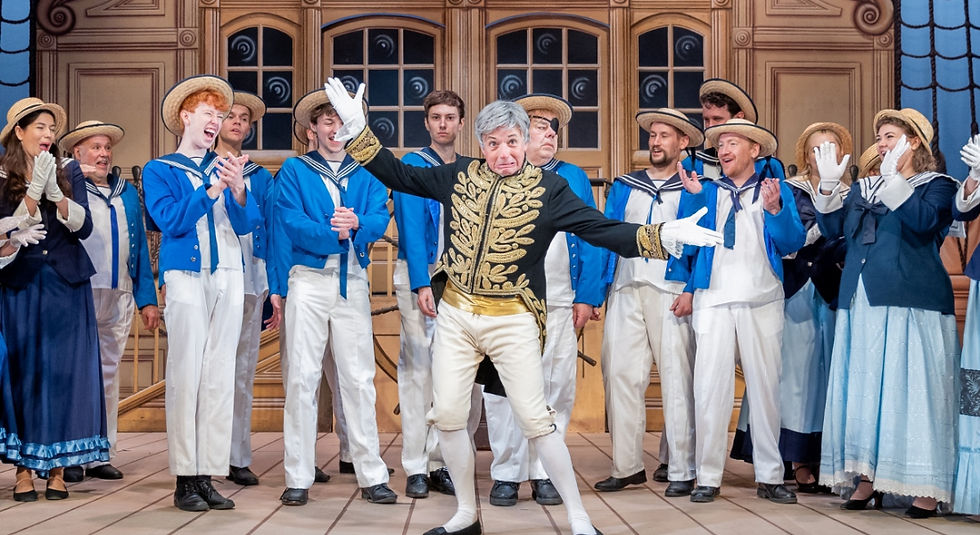Gilbert and Sullivan
The National Gilbert & Sullivan Opera Company
Buxton Opera House
July 31-August 10, 2024; 2 hrs 50 mins
(Further performances on August 4, 7.30pm and August 10, 2.30pm)


“That infernal nonsense Pinafore” was really the show that made WS Gilbert and Arthur Sullivan’s reputation as comic opera creators – with multiple touring troupes emanating from Richard D’Oyly Carte’s company and even a “Children’s Pinafore” doing the rounds at one point. It’s not difficult to see how much it appealed to late Victorian England.
The nonsense of the story is one thing (roles and social status reversed when it’s discovered that a Royal Navy captain and one of his ratings were inadvertently swapped as babies), but allied to it is some gentle undermining of the class-ridden British status quo of its time, combined with resolute patriotism. There's an awareness of creaking distinctions even in its own day, as the First Lord of the Admiralty, who started off as an office boy and never went to sea, was widely understood as a reference to the then holder of the post, one WH Smith.
The International Gilbert and Sullivan Festival bring a fresh and straightforward production by Bradley Travis (who also takes the role of Captain Corcoran) to Buxton, with the inimitable Simon Butteriss giving his cleverly camp portrayal of Sir Joseph Porter KCB (the aforesaid First Lord), and highly experienced G&S performers Bruce Graham (as Dick Deadeye) and Gaynor Keeble (as Little Buttercup). Ralph Rackstraw, the sailor who is in love with his captain’s daughter (though, as we see in the end, he’s the same age as her father), is played by the youthful lyric tenor Sam Marston, and Phoebe Smith as Josephine (his beloved), gives her a feisty demeanour with plenty of power in her soprano voice.
James Hendry conducts with much energy, and the National Festival Orchestra does him proud. The choreography, by Rae Piper and Paul Chantry (also in charge of that element in the outstanding The Pirates of Penzance in this festival), is constantly inventive and has the chorus busily at work. I particularly liked mildly referential aspects such as the feet-in-buckets routine in the Act One finale (shades of Matthew Bourne’s National Theatre My Fair Lady hoofing, among others), the tango-esque movement for Buttercup and Corcoran in Things are seldom what they seem, and the mops-for-props version of Never mind the why and wherefore – rather reminiscent of a Morecambe and Wise send-up.
This bill had a curtain-raiser, too: G & S’s Trial by Jury, the brief, one-act whimsy that was really the first inspired creation of the partnership. Directed by Bruce Graham (also in the role of the Usher), it gave members of the festival’s chorus a chance to shine in solo roles: Stephen Godward as the Learned Judge, Andrew Brown as the Defendant, Henry George Page as Counsel, Drew Sinclair as the Foreman of the Jury, and Claire Ward as the Plaintiff.
It depicts a scene we never encounter now: an action in the Court of the Exchequer for damages for breach of promise of marriage: the plaintiff the unhappy would-be bride, the defendant the reluctant bridegroom. It’s still capable of raising a laugh, with the histrionics of the plaintiff (complete with her bridesmaids), the unlikely life story and fruity thoughts of the learned judge (who sends a paper missive first to the most fanciable bridesmaid then, changing his mind, to the bride herself), and the evident anti-defendant bias of all concerned. The work is given a vigorous outing, even if the eight-man jury did have to hold on to the scenery to stop it wobbling too much.
More info and tickets here






